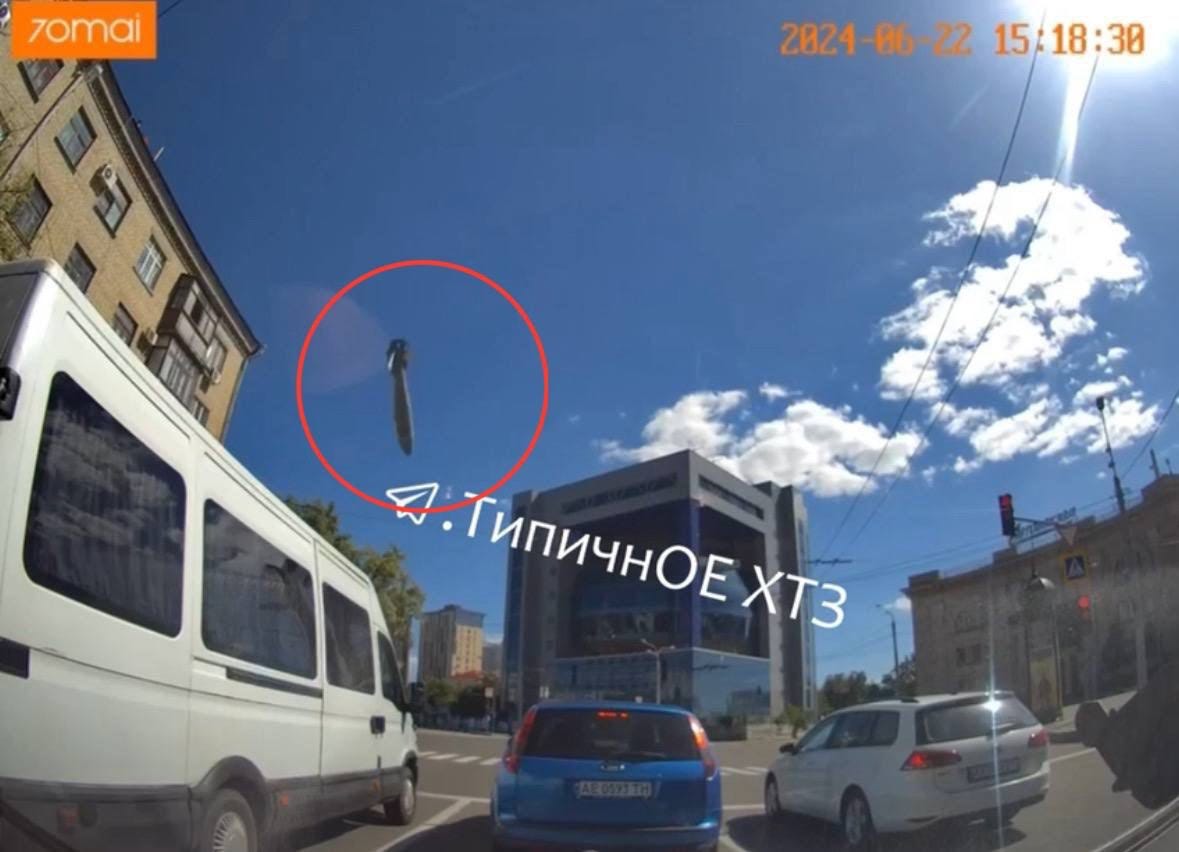Monday in Ukraine
Many cargo ships are sailing through the Black Sea, thanks to Ukraine fighting back
Want to know what’s happening in Ukraine? Read on for the real intelligence and mood, from the most informed voices.
TODAY’S HIGHLIGHTS:
Russians hit Kharkiv city hard over the weekend. Here from the dash cam of a car at a red light you can see a missile falling in traffic. The Russians claimed they were going after a police hospital, which would be a war crime anyway. Instead they hit people out and about on a Saturday.
Meanwhile, Moscow expresses outage that Ukraine seems to have used American-provided long-range weapons, Attack-ems, to hit Russian-occupied Crimea. It seems that Russian air defense rained debris on beachgoing occupiers resulting in five fatalities including three children. Moscow did not explain why it was ok for Russia to hit civilians in Kharkiv.
Ukrainian cities are filled with the unmelodious hum of generators, as the power situation continues to be difficult.
An American investor in Ukraine makes a point of hiring Ukrainians because he knows they will be more motivated than people he might hire in the US right now.
In our daily Silicon Curtain briefing, Dr. Ivana Radner, a research fellow and expert on Russia's information security, highlights Putin's strategic use of nuclear blackmail.
Catch Joe Lindsley’s Ukraine report today live on WGN Radio 720 at 7:20am Chicago / 3:20pm Ukraine at wgnradio.com or later via this newsletter or UkrainianFreedomNews.com
UKRAINIAN FREEDOM NEWS: Please consider sustaining us at $10/month in our mission of TRUTH TO THE WORLD & SUPPLIES FOR FREEDOM.
WGN RADIO DAILY WAR JOURNAL — 10 Minutes Daily: Watch, Listen, or Read | from Friday 21 June
War Day 847: Putin in Corner? Ukraine Getting Stronger?
The only American news show reporting live from Ukraine EVERY WEEKDAY of Russia’s full-scale invasion; with Bob Sirott in Chicago and Joe Lindsley in Lviv
Black Sea Breakthrough: Commercial Ships Sail Freely
BOB SIROTT: The US appears to have expanded its agreement with Ukraine to strike over the border, inside Russian territory. And Joseph Lindsley standing by now in Ukraine. Joe, hi. I guess this is good news for you and Ukraine, isn't it?
JOE LINDSLEY: Good afternoon from Lviv. There's a strange mood and feeling here. Obviously, it's good news, but it's news that for everyone here, this could have happened a long time ago, and a lot of lives would've been saved.
We saw when the US gave permission for Ukrainians to hit back in Kharkiv region just about a month ago, we've seen positive results without major negative repercussions from Russia. Russia has been weakened in that region. Perhaps that test gave Washington some courage or even just some data to say, "Hey, look, we can actually try to win here instead of just holding on."
Another thing: Look at what's happening in the Black Sea. There are hundreds of commercial ships, including 11 ships that in the past 24 hours have been inbound to the Port of Odesa. This is remarkable because no one could even imagine this in 2022. Ukraine had to have that deal brokered by the UN to have a very small safe passage corridor. But now, simply by the way the Ukrainian military and special intelligence forces have destroyed Russia's navy there, the Black Sea is safer for commerce. That's a huge success. If you give Ukraine more ability, this thing can be turned around.
Putin's Poker Game: Nuclear Threats and Authoritarian Alliances
I've seen reports from military experts and open-source intelligence experts analyzing the images of the Russian fleet in the Caribbean Sea, especially when they were docked in Havana Harbor. Many credible reports suggest those Russian ships look like they're falling apart, actually missing pieces.
Russia obviously wants to project a sense of strength, as we talked about this week with the meetings with Kim Jong-Un in North Korea and that huge spectacle in which Putin was seemingly honored. But, to whom else can Putin turn in this moment?
We can see this with a lot of positivity. It's also obvious that every time Ukraine is in a position of strength, the Russians will try something new. They're trying to win, so it's not going to be easy. We see evidence of more Russian spy activity and propaganda. Putin's recent nuclear threats in Vietnam, right after his visit to North Korea, show he feels cornered and has to respond.
Putin even threatened South Korea, which has so far not given lethal aid to Ukraine, only humanitarian aid and some basic military equipment. Although South Korea was doing less than other countries, Putin tried to bully them. There are indications that for the first time, South Korea, as a result of Putin's bullying, is considering sending lethal aid.
We are in a phase of a poker game to see who's going to project strength and toughness. Meanwhile, on a micro level, it's up to everyone here to hold on. I've had people knocking at my door, the door of our news bunker, asking for help with heavy sadness. All different types of problems. A woman needed help transferring her soldier son to another hospital because there wasn't enough transport available. So here, 900 miles away, they come to me in America for help. It's extremely difficult.
Russian Military Decay: A Fleet Falling Apart
BOB SIROTT: You mentioned the antiquated Russian ships. I was watching a story about Russia's arsenal. It vastly outnumbers Ukraine's, but a lot of it is really old. This morning, there's a report about what the Ukrainians are doing with their drones. They are changing the navigation equipment, updating the antennas and video feeds to avoid frequencies that Russia is targeting. It sounds like the Ukrainians are modernizing a lot of their equipment. Even though they don't have as much as the Russians, perhaps it's better.
Innovate to Survive: Ukrainian Technological Advancements
Yeah, there is such rapid innovation happening here. Anyone that knows anything about tech or innovation knows you have to have freedom and motivation to innovate. You can't innovate if you're depressed and don't see hope for your future. Ukrainians are well-motivated in a way that Russians are not.
The Russians have adapted in many ways, but the speed here in Ukraine is impressive. Almost everyone who can is innovating. Children in schools are learning how to tinker with drones; that's part of the curriculum now.
Western defense companies and people from Silicon Valley are starting to pay attention. If you want innovators, this is the society for it. Even though there are problems with power and electricity, people are motivated. An American investor here said he makes a point of hiring Ukrainians because he knows they will be more motivated than people he might hire in the US right now.
A Nation of Innovators: Ukraine's Tech Potential
BOB SIROTT: One of our listeners in Las Vegas, Tim, is paying attention. He emailed us, saying, "Hi Bob, I've been listening to Joseph Lindsley’s reports from the beginning. It is possibly the best of world-class reporting." That's nice, and we hope Tim comes home with money from Las Vegas.
JOE LINDSLEY: Yeah, good luck to him in Vegas. And thanks for those good words.
Daily Intel from SILICON CURTAIN — with host JONATHAN FINK in OXFORD
Ivana Stradner - Putin's Desire for Further Territorial Conquests is Unlikely to Stop Unless Stopped
Dr Ivana Stradner is a Research Fellow at The Foundation for Defence of Democracies (FDD) a non-partisan institution focusing on national security and foreign policy. She is a Special Correspondent @KyivPost and expert on Russia’s information security. Ivana has been published in many academic journals and the media, including The Washington Post, The National Interest, Real Clear World and Defence, Newsweek, National Review, and Foreign Policy.
Key Points:
Putin's Desperation and Body Language: The submissive body language of Putin during his visit to North Korea indicates his weakness. His need to align with countries like China, Iran, and North Korea underscores his strategy to create a multipolar world, highlighting the vulnerability of his regime.
Nuclear Blackmail Strategy: Putin continues to use nuclear blackmail as a strategic tool. This tactic, which dates back to the Cold War, plays on the fears of nuclear escalation, impacting Western decisions such as the reluctance to send certain weapons to Ukraine.
Weaponizing Vulnerabilities: Putin leverages fundamental vulnerabilities like energy, food, and migration to destabilize Western alliances. By injecting money and disinformation into opposition forces, he creates an environment of fear and panic, furthering his strategic objectives without direct military intervention.
Information Warfare: Russia excels in information warfare, using deception and propaganda to create chaos and polarize the West. This approach is effective because it requires less effort to destroy ideas and create confusion than to build and promote constructive narratives.
Strategic vs. Tactical Thinking: The West often thinks tactically, focusing on short-term goals, while Putin thinks strategically with long-term objectives. This strategic thinking allows Russia to connect various geopolitical dots, using consistent messaging and cultural nuances to exploit Western weaknesses across different regions.
Serhii Sternenko, Ukrainian activist
If @POTUS had allowed Ukraine to strike russian airfields with ATACMS, this attack on Kharkiv might not have happened.
Correcting Washington’s Ukraine math:
UKRAINIAN FREEDOM NEWS: Please consider sustaining us at $10/month.
Regular Resources:
Air-Raid Alert Map
State of the War Map: shows Russian positions and what Ukrainians have taken back; updated daily
Mriya Report: a 24/7 Twitter audio channel featuring the best Ukrainian volunteers and representatives. Joe Lindsley joins every Wednesday at 9pm Kyiv time.
Follow us across various social media: Instagram, Twitter, Facebook, or via UkrainianFreedomNews.com.












